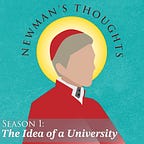Reading for Day 30: The Idea of a University, Discourse III, Bearing of Theology on Other Branches of Knowledge § 8
Complete Recording of Discourse III @ Catholic Culture Audiobooks
Paperback with Introduction by Dr. Don Briel available @ Cluny Media
Full online text of The Idea of a University and other works by St. John Henry Newman are available @ the National Institute for Newman Studies’ Newman Reader
If this be a sketch, accurate in substance and as far as it goes, of the doctrines proper to Theology, and especially of the doctrine of a particular Providence, which is the portion of it most on a level with human sciences, I cannot understand at all how, supposing it to be true, it can fail, considered as knowledge, to exert a powerful influence on philosophy, literature, and every intellectual creation or discovery whatever. I cannot understand how it is possible, as the phrase goes, to blink the question of its truth or falsehood. It meets us with a profession and a proffer of the highest truths of which the human mind is capable; it embraces a range of subjects the most diversified and distant from each other. What science will not find one part or other of its province traversed by its path? What results of philosophic speculation are unquestionable, if they have been gained without inquiry as to what Theology had to say to them? Does it cast no light upon history? has it no influence upon the principles of ethics? is it without any sort of bearing on physics, metaphysics, and political science? Can we drop it out of the circle of knowledge, without allowing, either that that circle is thereby mutilated, or on the other hand, that Theology is really no science?
And this dilemma is the more inevitable, because Theology is so precise and consistent in its intellectual structure. When I speak of Theism or Monotheism, I am not throwing together discordant doctrines; I am not merging belief, opinion, persuasion, of whatever kind, into a shapeless aggregate, by the help of ambiguous words, and dignifying this medley by the name of Theology. I speak of one idea unfolded in its just proportions, carried out upon an intelligible method, and issuing in necessary and immutable results; understood indeed at one time and place better than at another, held here and there with more or less of inconsistency, but still, after all, in all times and places, where it is found, the evolution, not of half-a-dozen ideas, but of one.




